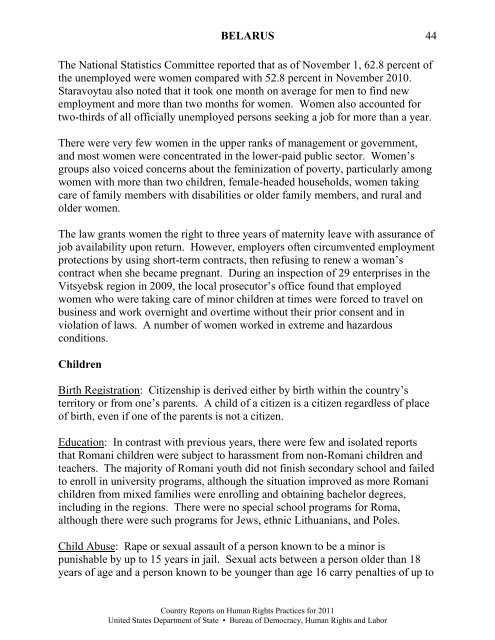belarus executive summary - US Department of State
belarus executive summary - US Department of State
belarus executive summary - US Department of State
You also want an ePaper? Increase the reach of your titles
YUMPU automatically turns print PDFs into web optimized ePapers that Google loves.
BELAR<strong>US</strong> 44<br />
The National Statistics Committee reported that as <strong>of</strong> November 1, 62.8 percent <strong>of</strong><br />
the unemployed were women compared with 52.8 percent in November 2010.<br />
Staravoytau also noted that it took one month on average for men to find new<br />
employment and more than two months for women. Women also accounted for<br />
two-thirds <strong>of</strong> all <strong>of</strong>ficially unemployed persons seeking a job for more than a year.<br />
There were very few women in the upper ranks <strong>of</strong> management or government,<br />
and most women were concentrated in the lower-paid public sector. Women’s<br />
groups also voiced concerns about the feminization <strong>of</strong> poverty, particularly among<br />
women with more than two children, female-headed households, women taking<br />
care <strong>of</strong> family members with disabilities or older family members, and rural and<br />
older women.<br />
The law grants women the right to three years <strong>of</strong> maternity leave with assurance <strong>of</strong><br />
job availability upon return. However, employers <strong>of</strong>ten circumvented employment<br />
protections by using short-term contracts, then refusing to renew a woman’s<br />
contract when she became pregnant. During an inspection <strong>of</strong> 29 enterprises in the<br />
Vitsyebsk region in 2009, the local prosecutor’s <strong>of</strong>fice found that employed<br />
women who were taking care <strong>of</strong> minor children at times were forced to travel on<br />
business and work overnight and overtime without their prior consent and in<br />
violation <strong>of</strong> laws. A number <strong>of</strong> women worked in extreme and hazardous<br />
conditions.<br />
Children<br />
Birth Registration: Citizenship is derived either by birth within the country’s<br />
territory or from one’s parents. A child <strong>of</strong> a citizen is a citizen regardless <strong>of</strong> place<br />
<strong>of</strong> birth, even if one <strong>of</strong> the parents is not a citizen.<br />
Education: In contrast with previous years, there were few and isolated reports<br />
that Romani children were subject to harassment from non-Romani children and<br />
teachers. The majority <strong>of</strong> Romani youth did not finish secondary school and failed<br />
to enroll in university programs, although the situation improved as more Romani<br />
children from mixed families were enrolling and obtaining bachelor degrees,<br />
including in the regions. There were no special school programs for Roma,<br />
although there were such programs for Jews, ethnic Lithuanians, and Poles.<br />
Child Abuse: Rape or sexual assault <strong>of</strong> a person known to be a minor is<br />
punishable by up to 15 years in jail. Sexual acts between a person older than 18<br />
years <strong>of</strong> age and a person known to be younger than age 16 carry penalties <strong>of</strong> up to<br />
Country Reports on Human Rights Practices for 2011<br />
United <strong>State</strong>s <strong>Department</strong> <strong>of</strong> <strong>State</strong> • Bureau <strong>of</strong> Democracy, Human Rights and Labor
















